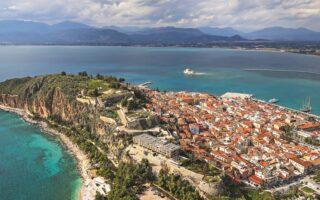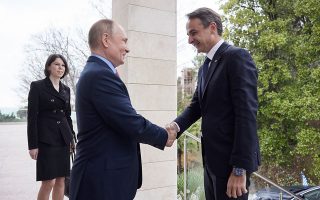The Greek crisis through Schaeuble’s memoirs
How did he take the wind out of Venizelos’ sails? What was the bet he lost on Greece? What did he wish Tsipras? And why did he think Tsakalotos was assigned to supervise Varoufakis? Kathimerini takes a look at the late German finance minister’s autobiography
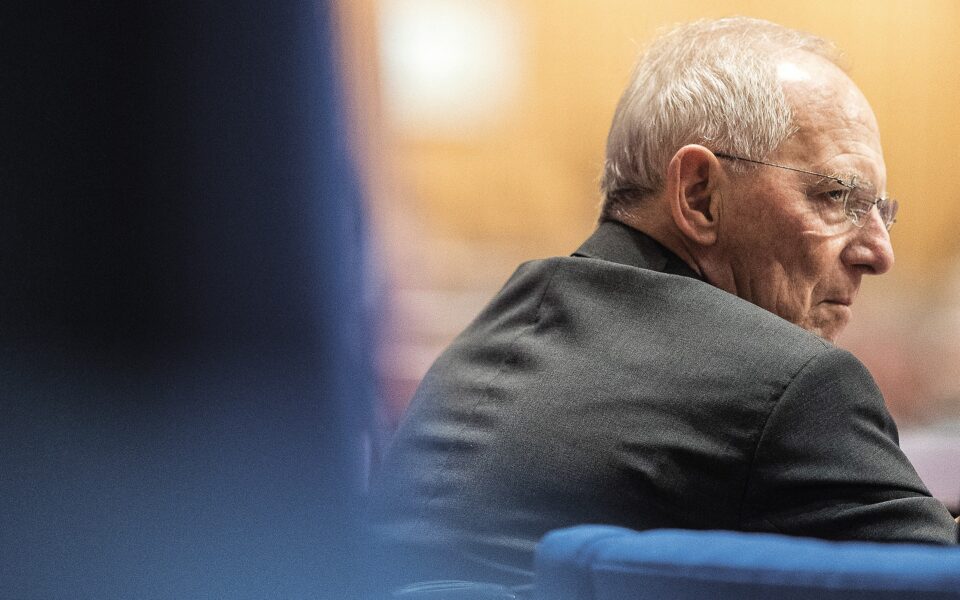
His political career lasted over half a century; it was full of crises, scandals, even an assassination attempt. But some of the most dramatic passages in the memoirs of Wolfgang Schaeuble (September 18,1942 – December 26, 2023) concern Greece.
All main actors of the financial crisis are sketched in his memoirs; the prime ministers and ministers with whom Schaeuble was called to resolve one of the most formidable challenges to the European project. Prime ministers George Papandreou, Antonis Samaras, Alexis Tsipras and finance ministers George Papaconstantinou, Evangelos Venizelos, Yanis Varoufakis and Euclid Tsakalotos are some of the persons subjected to the late German finance minister’s ever-sarcastic narration; Schaeuble is aware of how hated a figure he had become to the Greeks.
The book “Erinnerungen” (Memoirs), subtitled “My Life in Politics” was published in Germany by Klett-Cotta on Monday, April 8. Kathimerini acquired the exclusive rights of publishing excerpts from the book in Greek.
 Schaeuble’s narration begins in May 2010 – a year he calls an annus horribilis at both a personal and a European level – when, gravely ill, he arrives in Brussels to attend the Eurogroup’s crucial meeting on the first aid package to our country. “You are very ill,” his doctor told him, a phrase he often heard that year. When he was discharged from the hospital, he was accompanied by his wife who was holding the drip feed, “which she tied to the airplane’s ceiling. I will never forget the sight: The stability of the euro and, with it, Europe’s future, was hanging by a thread, much as my health was hanging from that drip feed,” he writes.
Schaeuble’s narration begins in May 2010 – a year he calls an annus horribilis at both a personal and a European level – when, gravely ill, he arrives in Brussels to attend the Eurogroup’s crucial meeting on the first aid package to our country. “You are very ill,” his doctor told him, a phrase he often heard that year. When he was discharged from the hospital, he was accompanied by his wife who was holding the drip feed, “which she tied to the airplane’s ceiling. I will never forget the sight: The stability of the euro and, with it, Europe’s future, was hanging by a thread, much as my health was hanging from that drip feed,” he writes.
Health breakdown
“Developments in Greece brought me back to the office too soon and, as a result, I constantly interrupted my treatment,” Schaeuble says. “Sixteen hours a day spent in the office, in meetings, planes and meeting halls, forced me to sit all the time, which is in itself tiresome but poison for a man confined to a wheelchair.”
He twice submitted his resignation to Chancellor Angela Merkel, but she gave him the impression that she didn’t want to face the crisis without her experienced minister by her side. However, their disagreements were intense: “Like my French colleague [Christine] Lagarde and the then president of the Eurogroup [Jean-Claude Juncker], I believed Europeans ought to solve their problems by themselves. Merkel, on the contrary, wanted to involve the IMF in the European debt crisis.”
Preparing Grexit
In criticizing “the usual blame game that Greeks so successfully knew how to play,” Schaeuble asks rhetorically, “Who likes admitting that they lived beyond their means?” But he notes that former finance minister George Papaconstantinou’s book “Game Over” is “a merciless self-criticism of the way the Greek government secured the accession to the euro.”
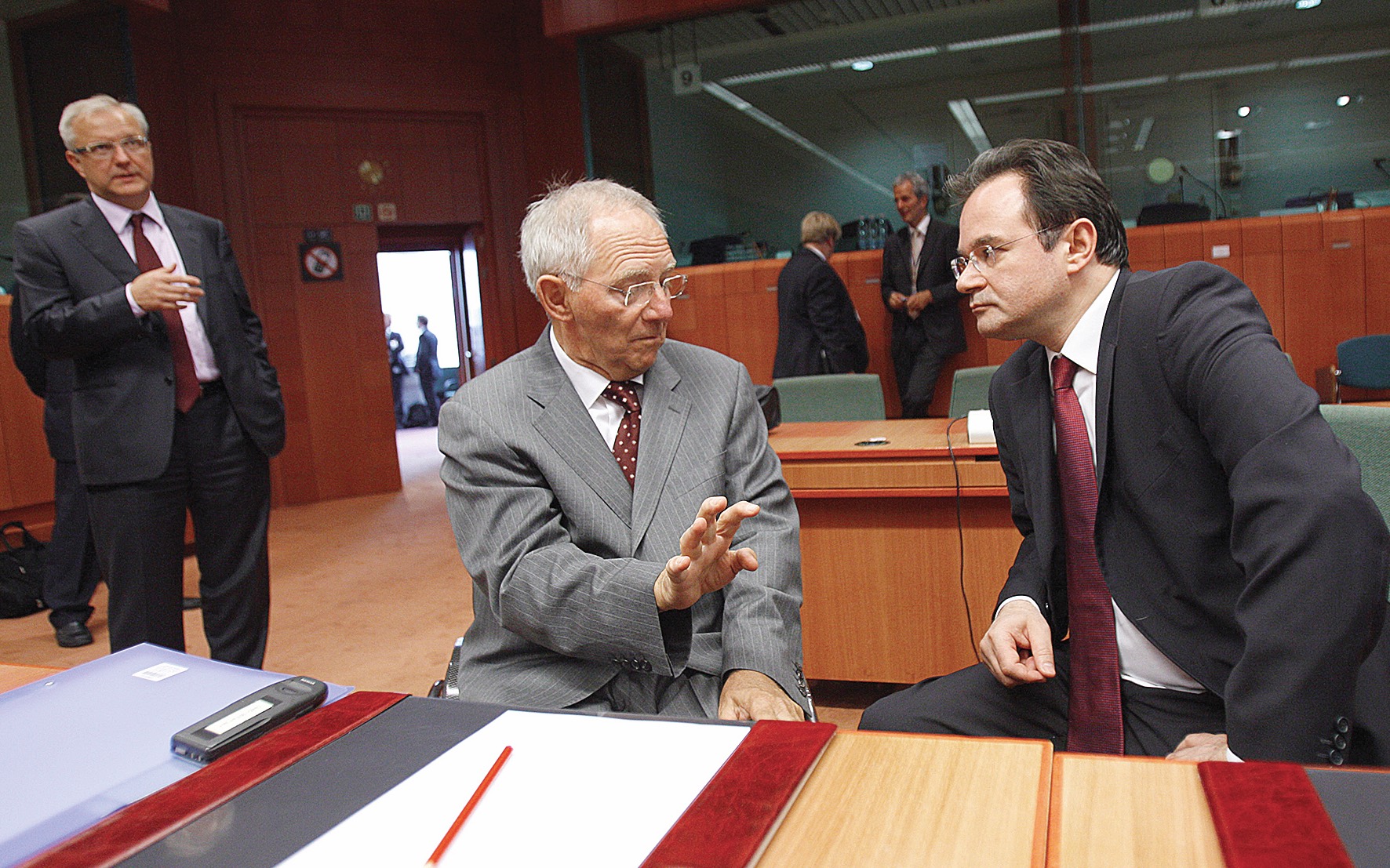
“The fact that I became a bogeyman did not hurt me, this is something one must deal with in politics, even the tasteless comparisons with the Nazis. A flood of support through letters and emails was a counterweight to the hatred on social media. However, the campaign of slander reached an inexcusable low ebb in spring 2017, when an extremist group attacked Lucas Papademos, the head of a transitional government, with a letter bomb, and also attacked the IMF offices in Paris, injuring a female staff member. A bomb mailed to me was intercepted at the ministry’s mail sorting office and was disarmed.”
Schaeuble reminds his readers that left-wing intellectual Jurgen Habermas had called him the “last emblematic European in the [German] cabinet,” and continues: “When the clash [over the Greek debt] reached a climax in 2015, people forgot that, in the initial phase, I was the pro-European one compared to the chancellor, who used her hesitation to aid Greece to burnish her image as ‘Madam No.’”
‘I knew the proposal would have profound implications for Greek sovereignty, and Venizelos rejected it emphatically’
Already in 2010, Schaeuble had started to look into “alternative scenarios,” apparently with the chancellor’s agreement. “My doubts [about Greece’s readiness for reforms] led me to an early consideration of alternative scenarios. Already, in 2010, I did not exclude the possibility of a eurozone member exiting, at the end of a succession of actions and as a last resort – at that point, indeed, in agreement with the chancellor. With then state secretary at the Ministry of Finance Jorg Asmussen [Note: a Social Democrat], I considered whether a country with low competitiveness, such as Greece, could remain in the common currency. Would a temporary exit from the euro, and a devalued national currency aimed at boosting competitiveness, be feasible? Wouldn’t such a terrifying event be preferable to a never-ending terror, since it would be easier to deal with a single sharp shock than with chronic austerity programs? Even if the shocks from such a move would be difficult for all parties involve, this monetary reform would mean that the road to recovery would start the day after.”
Dinner with Venizelos
At this point, Schaeuble recounts his first meeting with then newly appointed finance minister Evangelos Venizelos in June 2011. “I invited him to dinner, not in the ministry, but somewhere more informal, and also as a sign of appreciation to Tim Raue’s award-winning restaurant [two Michelin stars] in order to express my doubts… What I told him apparently destroyed his appetite; he ate almost nothing when I exposed my views on the two alternatives I presented. At first, I brutally asked him whether it would be better to entrust the European Commission, in Brussels, with implementing the [austerity] measures. I knew the proposal would have profound implications for Greek sovereignty, and Venizelos – who would rather be prime minister – rejected it emphatically. He made it clear that Greece wants to stay in the eurozone, regardless of the cost. But pride also prevented it from delegating parts of its sovereignty to a European institution.
“When Venizelos also rejected the ‘time-out’ I proposed, that is, the temporary exit from the monetary union leavened with generous EU support, we were left with the difficult path of reforms in the framework of the assistance programs. We would thus subject the Greeks to many tests and they, in turn, would have to proceed with a big internal devaluation that would bring many social difficulties in order to achieve fiscal restructuring, shrink the public sector and expand market flexibility, a long and painful process. But that was the choice the Greeks made, not other Europeans. I considered some of the Greeks’ reform attempts, with radical interventions, essential, but I sincerely admired their implementation.”
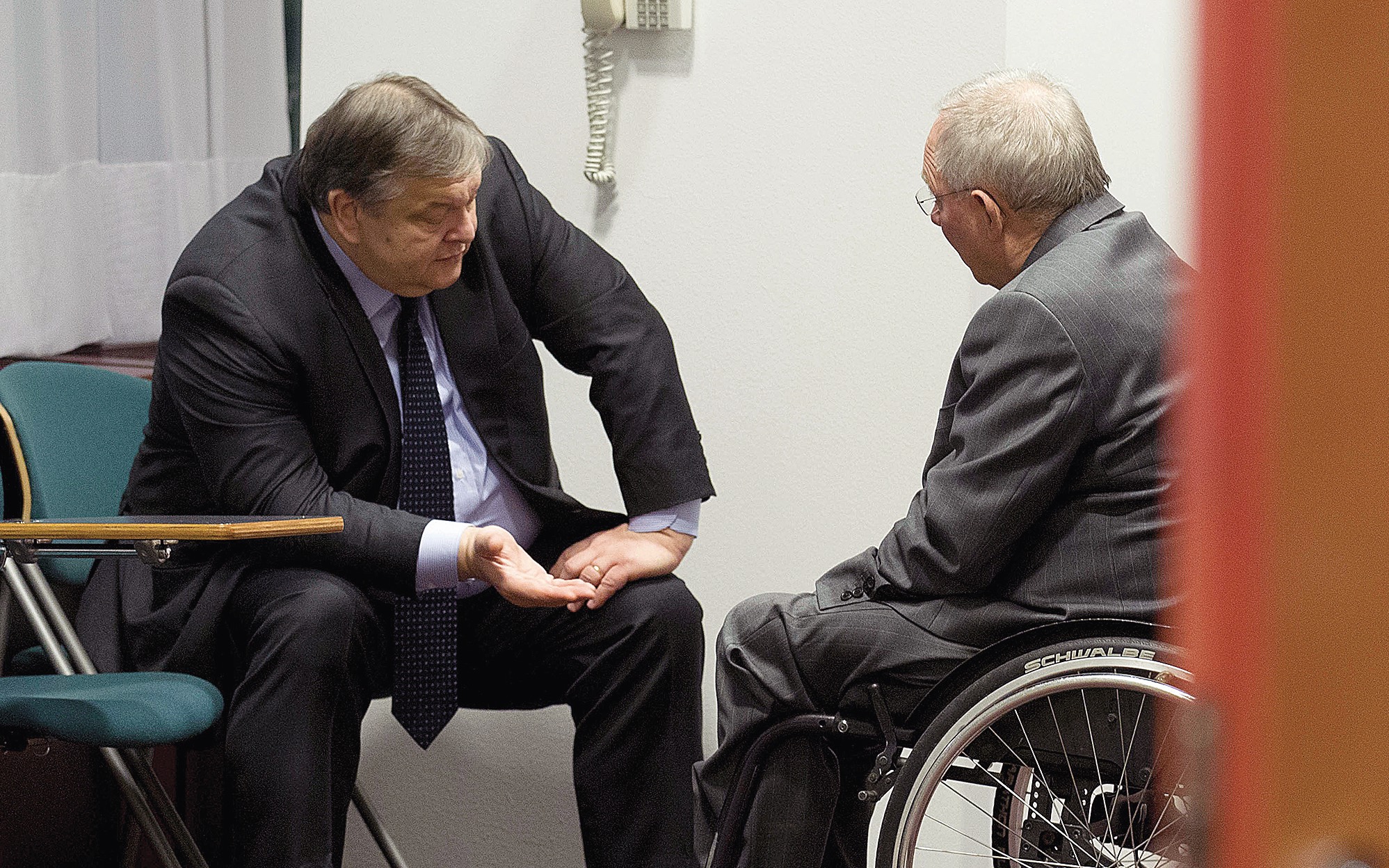
Schaeuble describes George Papandreou’s difficult moment at Cannes in November 2011 [Note: after he had decided to call a referendum on the austerity programs] and the pressure he was under by US President Barack Obama, France’s Nicolas Sarkozy, Angela Merkel and also the heads of the International Monetary Fund, Christine Lagarde, and the European Central Bank, Mario Draghi, who wanted the referendum to be a clear choice between accepting the assistance program or quitting the euro. “When I briefed my European colleagues on this, Spanish Finance Minister Elena Salgado, a reliable social democrat, was certain the referendum would never take place. I told her I was present when the referendum was agreed upon, but she challenged me to a bet. Venizelos, whom she knew well, would thwart this because he was Papandreou’s party rival. She was right about the referendum; it was canceled and Papandreou resigned on November 9, 2011. Of course, I made good on my bet to Salgado, a bottle of red wine. However, Venizelos did not become prime minister. Never was the possibility of Greece’s exiting the monetary union discussed with greater clarity than during those dramatic hours in Cannes.”
Schaeuble dismissed those frivolous public discussions about Grexit. “I should have been promptly dismissed even if I had even hinted at the possibility. It would have been a clumsy mistake with no prior agreement existing. I had, however, discussed the idea confidentially, even with the Greek side. Juncker’s motto, that one must lie if necessary, is alien to me. I don’t like telling lies. However, one can refrain from telling the truth publicly so that they don’t have to issue denials.”
The debt haircut
In the chapter on the Greek debt haircut, Schaeuble describes an intense dialogue he had with Sarkozy, after the French president and Merkel failed to agree. “Merkel and Sarkozy were negotiating on the haircut level with Josef Ackermann [Note: Deutsche Bank CEO] in his capacity as the chairman of the Institute of International Finance, not a very smart strategy move. Like other representatives of big German banks, Ackermann believed that the [Greek debt] problem could be solved with only marginal involvement from the private sector. When they informed me that the agreement reached provided a [haircut] of slightly above 20% for private creditors, I replied that anything under 50% should not be on the table… In the end, the haircut was 53% and, contrary to predictions, the world was not ruined. The haircut indeed meant billions in losses for the creditors, a historic development that critics of my stance vis-a-vis Greece tend to gladly forget. Smart investors, who had bought at low prices, often reaped significant profits. My relationship with Ackermann, who publicly denounced the ‘sin’ and whose role as creditor and adviser to the Greek governments I never liked, henceforth remained anything but friendly.”
As he starts recounting his second term as finance minister, from 2013 to 2017, Schaeuble detects a clear reform fatigue in Greece. “The increasing protests in Greek society, most of which targeted the troika, highlighted the problems about which I had warned my Greek colleagues, the [successive] finance ministers. My prophecy that it would be difficult in the long term to justify the constant cuts politically was borne out in 2014. Antonis Samaras, who had staunchly opposed austerity and the needed reforms when he was in opposition, followed an impressively decisive reform path as prime minister. During that year, however, his forces failed him, and his government was no longer in a position to make further efforts at reform. During a meeting in Berlin he explained that, like a mountaineer on a difficult climb, he needed a breather until the Greek people had reached the next stage of readiness.”
Meeting Tsipras
“I had already met [SYRIZA leader Alexis] Tsipras in 2013, when he was head of the opposition. I was interested in this man belonging to a rising movement who was raging against European policies. How did he think he could solve the crisis? Even though nobody wanted back then to welcome him in Berlin, I invited him to the Finance Ministry to exchange views. During our hour-long meeting, he tried to explain to me how austerity policies were wrong. He explained with disarming frankness that, in the upcoming election campaign, he would promise to keep the euro in the country at any cost; however, as prime minister, he would not accept conditionality, that is, any program. I replied with the same candor that I wished him defeat in the elections for his own good, because there was no way to keep the promise that would ensure electoral success. Greece could not remain a eurozone member without the necessary commitments. However, he was not impressed with my answer. What impressed me on this first meeting was his merciless intention to push for a stance, no matter how weak.” Schaeuble realized that it would be difficult to find common ground with the SYRIZA leader and that the crisis would return as “farce.”
The Varoufakis episode
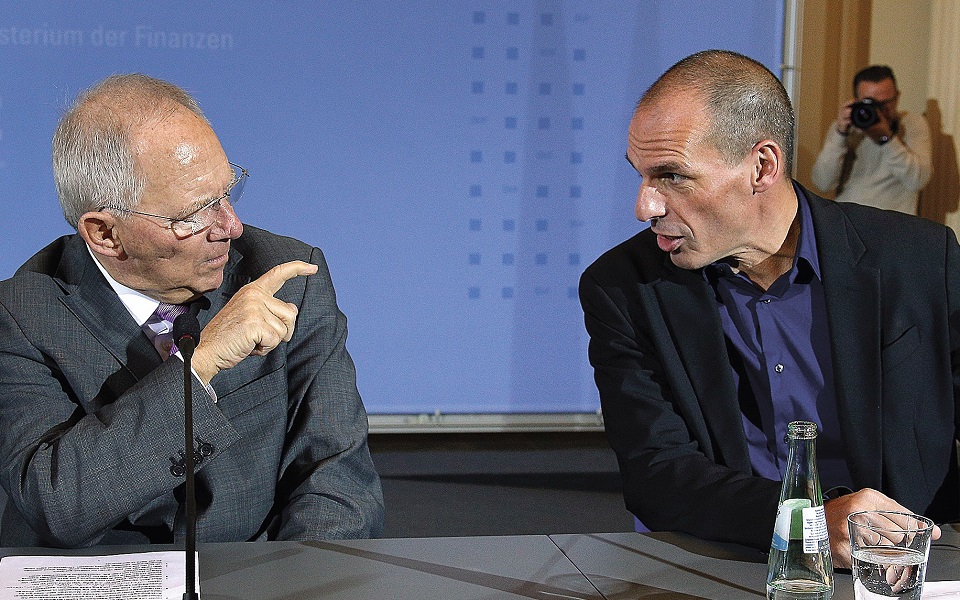
Schaeuble dedicates a separate sub-chapter to Yanis Varoufakis. “This crisis was largely caused by the man who, during the change of government, took over as Greece’s finance minister to implement the plan. Yanis Varoufakis was an economist known for his expertise in the field of game theory, yet he did not understand or consciously ignored the terms of the game. His first appearance at the Eurogroup, during which he lectured us in the manner of a university lecturer on how ignorant we all were, destroyed any good will from the start and proved disastrous for further cooperation. His provocative views and deliberately unconventional ways went hand in hand. He denounced the previous policy as a combination of ‘toxic mistakes’ and had already given it the finger in public. He was a minister with a pop star’s airs that left me coldly indifferent. I found all this frivolous, far from the seriousness the circle of finance ministers and the intensity of the occasion required. I neither wanted to compete with his undeniable star power that excited media professionals, especially in Germany, nor did I want to give in to his perpetual presence in the media. Among his major European counterparts, he ostentatiously visited me last. When he finally came to Berlin, I was advised by my associates to avoid a joint public appearance because of his much-vaunted communication skills. But I insisted on the usual protocol of visits, that is, in front of the flag and with a press conference. Varoufakis appeared accompanied by the deputy finance minister, Euclid Tsakalotos. When Varoufakis explained at length to me that in his government, with the exception of himself, everyone was irrelevant and even emphasized that he is not a member of SYRIZA, Tsakalotos intervened and said, ‘I know.’ This made me react by saying that, apparently, he is the supervisor. From this exchange of views, what I was left with, and this could also be the motto of Varoufakis’ short term, is ‘We agree to disagree.’ Although Varoufakis, who always wanted to have the last word, added at the joint press conference that we don’t even agree on that.
‘I knew the proposal would have profound implications for Greek sovereignty, and Venizelos rejected it emphatically’
“Because all us finance ministers spoke in English, we addressed each other by our first names, but I did not allow myself to be blinded by his compliments. Varoufakis liked to claim favor with exaggerated friendliness, while at the same time reproducing crude conspiracy theories. He whispered about the ‘dark forces’ that want to undermine democracy and human rights.”
According to Schaeuble, French Finance Minister Michel Sapin called Varoufakis “a strange bird,” full of ideas that never managed to move from the imaginary space of the intellect to the real world, a world of action and full of contradictions. “Welcome to reality, I thought to myself, when Varoufakis publicly complained that he was not given time to brief but was running from meeting to meeting with a gun to his head after sleepless nights. The blackest moment in the Eurogroup came in June, when we learned that Varoufakis was secretly recording our negotiations in order to make copies of them public. It remains open which was more infuriating: the breach of trust per se, or the claim that he had a ‘moral duty’ because he then had to answer to Parliament and the media. However, compared to other colleagues, I was less angry because in the end I have also negotiated with ministers of the SED [the successor to East Germany’s communist party] and I had a great wealth of experience from this point of view. Although Varoufakis assumed that he could, in the end, convince us with endless lectures that we had no choice but to accept a new haircut, even Sapin, who as a Frenchman was traditionally closer to the Greeks, made solidarity dependent on a responsible behavior. Varoufakis did not understand this and managed to turn even his most well-intentioned colleague against him.”
Eastern European finance ministers were especially outraged by the Greek minister’s attitude. “‘Yanis, stop!’ I still hear the voice of one of them in my ears. ‘I cannot take it anymore. You cry about the social benefits you have to cut. Your pensions are double ours. I, too, must explain to my people that we are in danger because of you.’” Schaeuble ends the relevant chapter with Christine Lagarde’s quip about the need to resume the dialogue between adults in the room and notes that he has never read a more “devastating” verdict on a colleague than that of Jeroen Dijsselbloem, then president of the Eurogroup, on Varoufakis: “Never has a finance minister has caused so much damage to his country in such a short time.”
The referendum’s ‘No’
Remembering his famous saying on February 28 (2015) “isch over” (it’s over), Schaeuble explains that he was convinced that only with such ultimatums and threats could the Greek retreat be achieved, although with a dramatic maneuver Tsipras managed to secure a four-month extension of the program. In the opinion of the former German finance minister, Tsipras probably had hoped for a marginal ‘No’ win in the July 2015 referendum, which would, on the one hand, provide him with a strong argument in the negotiations in Brussels and, on the other, a way out to explain his retreat to a domestic audience. However, the decisive result took him by surprise, since he was no longer able to get out of the predicament without losing his credibility. Schaeuble adopts Sapin’s assessment at this point. “Proof of this Sapin position is that Tsipras later accepted a program that was much tougher than what Greece could have had in April. But perhaps it was just the impasse and ruthless character of a leader, which I had observed in him, that gave him the opportunity to react quickly to the new situation. The fact that he managed to rally the majority of Greeks again is perhaps his greatest achievement, because this was on that occasion extremely important for the stabilization of the situation.” For Varoufakis’ successor, the “supervisor,” Tsakalotos, he uses the adjectives “serious and personally reliable,” in contrast to his predecessor. “Even if not much changed in terms of content, Tsakalotos avoided delivering lectures to the whole world. If one looks at the tug-of-war of the Greek crisis that lasted for years, it is impressive how strongly the Varoufakis episode that lasted a few months left its imprint, especially in Germany.”
Mulling Grexit again
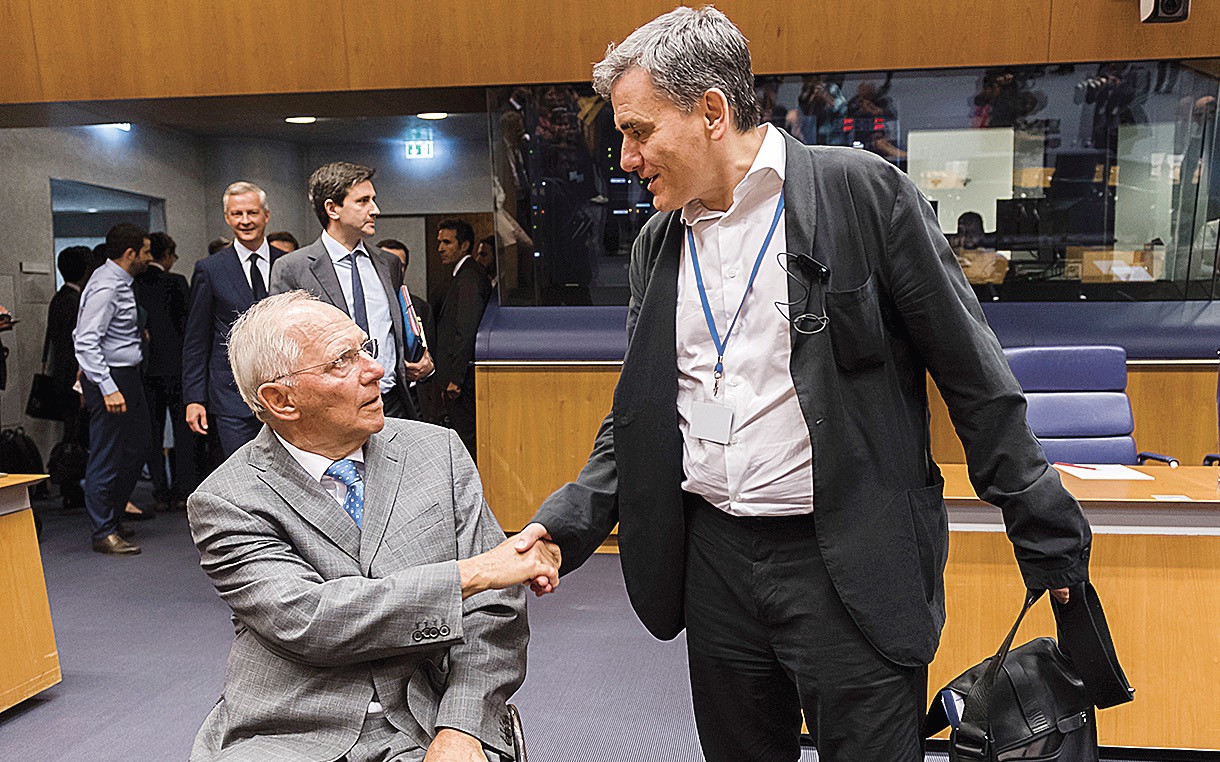
After the Greek referendum, a ministerial meeting was held in the Chancellery, in which Schaeuble argued again for a time-out. Surprisingly, the Social Democrat vice chancellor, Sigmar Gabriel, seemed to agree with him, while the then foreign minister and current president of the country, Frank-Walter Steinmeier, also a member of the Social Democrats, remained silent. “That’s why I confronted Merkel, who responded to my comments that this would only be possible in consultation with Francois Hollande, and he disagreed. She was not going to sacrifice the Franco-German relationship. Anyone who knows my devotion to Franco-German cooperation knows that this was heavy artillery. I replied that of course I did not want such a thing either, but that I was convinced that Hollande would not prefer to sacrifice Franco-German cooperation for the sake of his friendly feelings toward Athens. However, a clear stance from Merkel was a prerequisite for this. Only later did I realize that Gabriel was rather playing a double game. In the Chancellery he agreed with me and then said on social media that in such a difficult situation every possible proposal should be considered impartially. At the same time, however, together with [Pierre] Moscovici, they strongly argued against a blockade of Greece in the context of the European Social Democrats.”
When the time-out was then discussed, 15 of the 19 finance ministers were in favor; apart from Tsakalotos, the only dissidents were Sapin, Italy’s Pier Carlo Padoan and Cyprus’ Harris Georgiades.
At the summit that followed, the picture was very different, with Merkel hesitant and Tsipras prompted by US economists Jeffrey Sachs, Paul Krugman and Joseph Stiglitz, notes Schaeuble, who describes the “comatose” state the participants found themselves in at the end of the meeting. “This is consensus building by exhaustion. Merkel is an expert at this,” he says with his venomous humor. Schaeuble lauds Tsipras’ eventual conversion in accepting the austerity program. “It was a courageous step and Tsipras subsequently achieved remarkable things, which gave the opportunity to the next government to stabilize Greece. That deserves recognition.”
Good cop, bad cop?
Many wondered at the time whether Schaeuble and Merkel had allocated themselves roles in the crisis, bad cop and good cop, respectively. He himself denies it – although the outcome of the negotiations could be explained as a consequence of such a strategy. Even most of the economic sages in Germany have decided that without the invocation of a temporary, voluntary exit of Greece from the eurozone as a realistic scenario, Tsipras would not have retreated.
